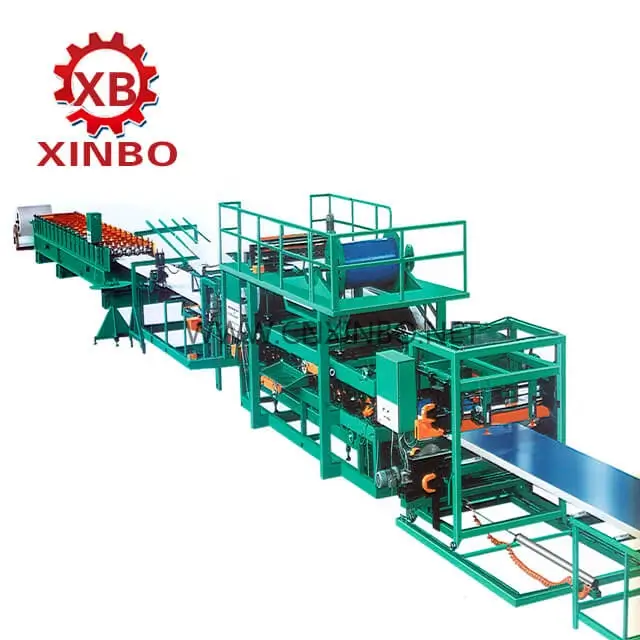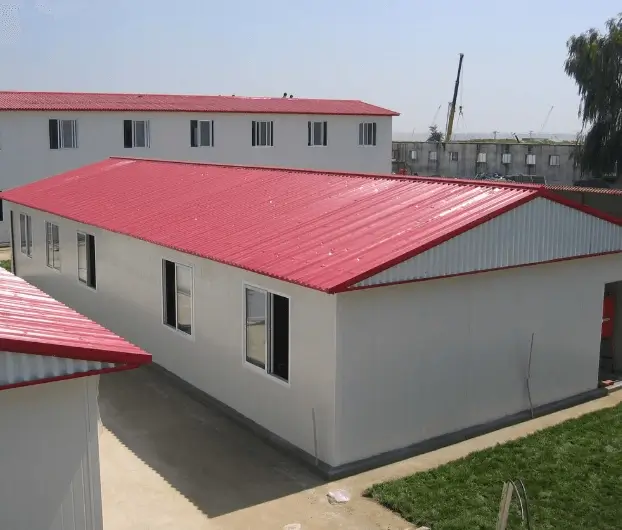How to Choose the Best EPS Sandwich Roof Panel Production Line Machine for Your Business
Utangulizi
Expanded Polystyrene (EPS) sandwich roof panels are popular building materials in today’s construction world. They’re loved for their great heat protection, light weight, and strong build. These panels play a big role in creating energy-saving buildings. They’re made using a special setup called the EPS sandwich roof panel production line machine. If you’re a business owner looking to start or grow in this field, picking the right equipment is super important for doing well.

Description of EPS Sandwich Roof Panel Production Line Machines
ya EPS sandwich roof panel production line machine is a smart system that builds insulated panels. It joins metal sheets with a soft EPS foam middle. These machines can work non-stop or in short bursts. They make panels in different sizes, usually between 50-250mm thick and 950-1200mm wide. What’s cool about them is their tough build, quiet running, and low power use.
They come with neat tools like PLC systems for automatic work. This helps keep the quality steady and speeds up the making process. The speed of making panels can be between 5-12m/min. So, you can easily change the output depending on what you need.
Components of the Production Line
ya EPS sandwich roof panel production line has many key parts. Each one helps in putting the panels together smoothly. These parts are:
-
Uncoiler: This tool sends steel coils into the line for the top and bottom metal sheets.
-
Roll kuunda Unit: It turns the metal coils into shaped sheets using metal rollers.
-
EPS Board Supplying System: This feeds pre-cut EPS boards in a back-and-forth pattern or non-stop for thicker panels.
-
Glue Applying System: It spreads glue to stick the metal sheets and EPS core together.
-
Laminating Unit: This part presses and heats to create the sandwich shape.
-
Panel Cutting Unit: It slices panels to the right length with band saws or wheels, guided by a computer for exact cuts.
-
Auto Stacking and Packing Unit: This stacks finished panels using vacuum suction or belts, and can even cross-stack roof panels.
Working Principle of the Production Line
The way an EPS sandwich roof panel production line works is through a steady, automatic process. It turns raw stuff into ready panels. First, steel sheets are unwound and shaped by roll forming. At the same time, pre-cut EPS boards are placed between these sheets.
Next, glue is added. Then, the whole thing goes into the laminating unit. Here, heat from steam or hot air, along with pressure, sticks the layers together. After it cools and sets, the final panel is cut to size. Lastly, it’s stacked and packed without any manual help.
Production Process of EPS Sandwich Roof Panels
Making EPS sandwich roof panels involves many steps. It’s a combined effort to ensure top-notch, insulated results. The steps include:
-
Material preparation
-
Sheet forming
-
Core application
-
Lamination
-
Curing
-
Kukata
-
Quality control & packaging
This method creates panels with awesome features, like a heat conductivity of 0.023-0.034 W/mK.

Advantages of Using EPS Sandwich Roof Panel Production Line Machines
Getting an EPS sandwich roof panel production line brings lots of perks for businesses. Some of these are:
-
Fast work thanks to automation
-
Lower labor costs since only 6–7 workers are needed per line
-
Steady and reliable product quality
-
Better use of materials, which saves money
-
Good for the planet with built-in recycling options
How to Choose the Best EPS Sandwich Roof Panel Production Line Machine for Your Business
Assess Production Capacity and Scale
Figure out how much you need to produce. Machines come with different speeds, like 0-4.5m/min or 5-12m/min, and daily outputs, such as 100-280m²/h. Also, think about growth. Machines that can be upgraded or added to are great for handling more work later without needing a full swap.
Evaluate Automation and Technology Levels
Go for machines with high-tech automation, like PLC controls and touch-screen setups. These help with exact work and cut down on mistakes. If you want less manual work and more steady results, a fully automatic system is the way to go.
Consider Material Compatibility and Quality
Make sure the machine can handle different materials, like various EPS densities and metal thicknesses from 0.35-0.8mm. Check for features that keep panels flat and ensure the layers stick well together.
Analyze Cost and ROI
Machine prices can start at $20,000 for simple models and go over $100,000 for fancier ones. Don’t forget to think about power use, around 30kW, upkeep costs, material expenses, warranty deals, and how much demand there is in the market when figuring out your return on investment.
Space, Ergonomics, and Environmental Factors
Check your workshop size needs, like 50m x 10m. Pick machines that run quietly and are easy to use. Also, look for ones that meet green standards, such as controls for emissions.
Core Material and Application-Specific Needs
If you’re only making panels for roofs in factories or storage spaces, choose a machine that’s really good at making weather-proof shapes suited for those places.
Supplier Reliability and After-Sales Support
Pick suppliers who are trusted for on-time delivery, custom options, training help, spare parts, and quick support after purchase. “Dedicated, united, innovative, mutual benefit” is our guiding idea at Xinbo. It shows our promise to make customers happy with full services from design advice to setup.
Maswali ya kawaida
Q1: What power requirements should I expect?
A: Most lines use about 30kW, based on how they’re set up.
Q2: Can I produce both wall and roof panels?
A: Yes, many lines can do both with small changes.
Q3: How many workers do I need?
A: Usually, 6–7 people per line are enough because of the high automation.
Q4: Are these machines environmentally friendly?
A: Yes, lots of models have recycling systems to cut down on waste while making panels.
Get The Best EPS Sandwich Roof Panel Production Line Machine from XinBo
ya XinBo is a full-fledged manufacturer started in 2014. With skilled engineers who focus on new ideas, we promise top quality and fresh technology in our machines. Whether you need regular models or something made just for you, our roll forming machines are built to match what customers want. We even plan container loading smartly, fitting machines into a 20feet or 40feet container to save on shipping costs.
Our machines reach places like Europe, the Middle East, Africa, and the Americas. They’ve been sent to countries such as the United Kingdom, USA, Brazil, and Tanzania, showing that people worldwide trust Xinbo’s quality. For businesses wanting lasting value from an EPS sandwich roof panel production line machine, we’re excited to hear from you. Drop us a message, and we’ll get back to you within 24 hours!
Posts kuhusiana

Ubora mzuri
XinBo mashine kufanya CO. LTD ni mtengenezaji wa kitaalamu na nje katika roll kuunda mashine,
Tazama zaidi→

 Kihispania
Kihispania Urusi
Urusi





